
Why is SEO Misunderstood?
Why is SEO Misunderstood?
SEO is not magic.
But even with how commonplace SEO has become, there’s still a lot of mystery that surrounds the process.
We’ve covered what SEO is and why it’s important for marketing already, so today I want to talk about why a modern marketing staple is so easily misunderstood.
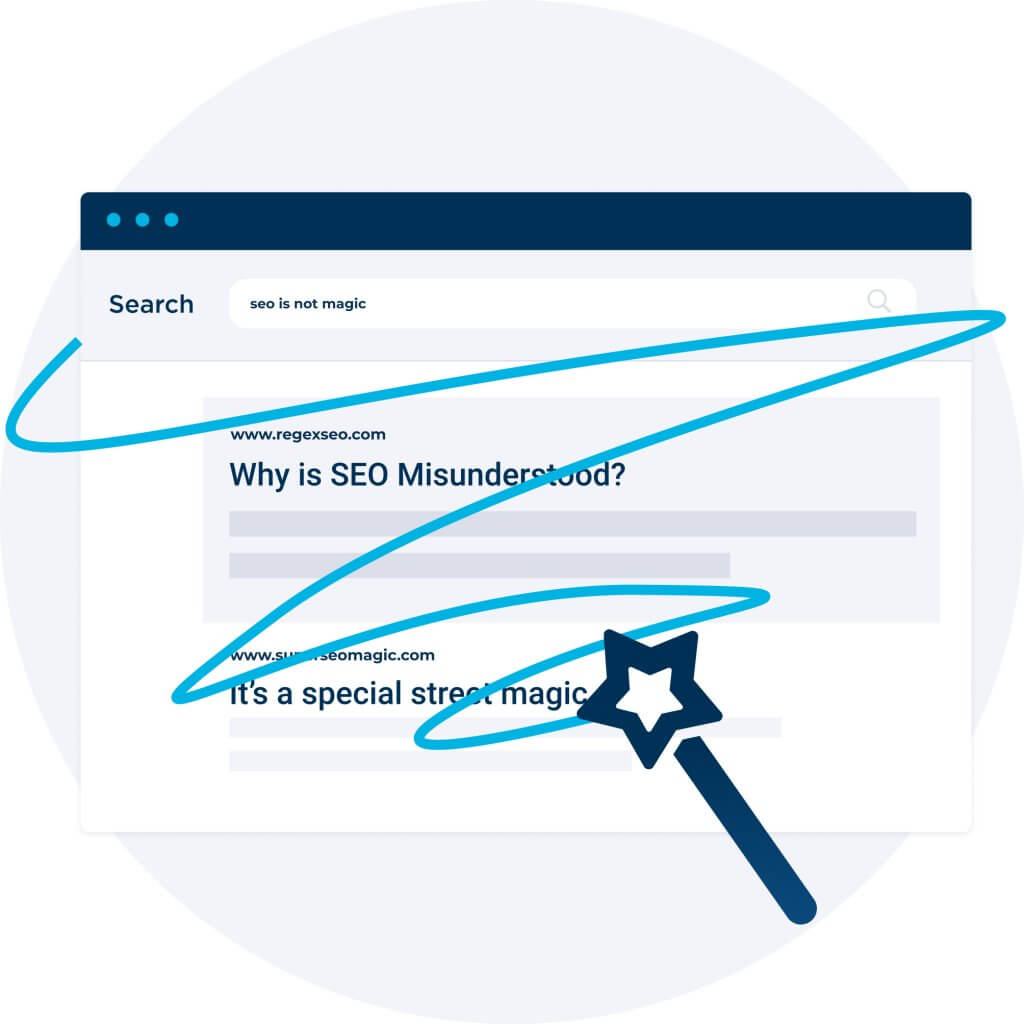
The Question: Why is SEO Misunderstood in the First Place?
Like most misunderstandings, the source is a lack of information. It’s kind of like The Wizard of Oz.
To simplify in the extreme, SEO is often misunderstood because it’s hard to see or hold. People usually imagine their purchase as a physical thing to hold, but with SEO only the result is really visible.
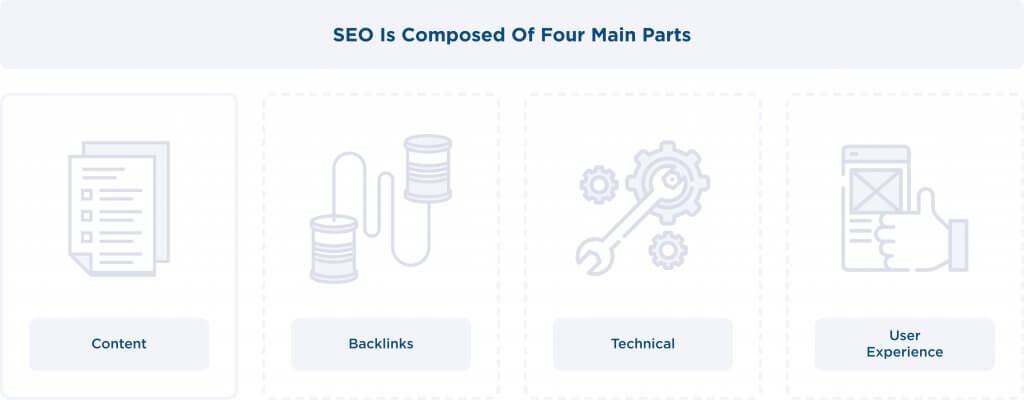
Out of the four, content is the only aspect of SEO that really fits that ‘product’ mold. Backlinks, technical optimization, and user experience design are less tangible. As a result, it’s hard for management and upper level execs unfamiliar with SEO to explicitly see where any investment is going.
This is what makes SEO seem like magic. A lot of the important work happens behind a curtain.
Why Should You Know About SEO?
Clearing up these misconceptions is important because it smooths out the development and execution of the SEO process. Additionally, it allows companies investing in SEO to more fully understand where the money goes.
SEO is a major part of successful online marketing, and online marketing is a major part of any successful marketing plan.
Nobody wants to invest their money in the vague promise of “give us money, and you might get more business,” which is yet another reason clearing up the myths and misconceptions surrounding SEO matters.
Unpacking SEO’s Biggest Misconceptions

Let’s dig a bit deeper into the mysteries of SEO.
While the primary reason is the apparent lack of deliverables beyond content and metrics, that’s not the only contributing factor.
In fact, there are two pretty major aspects: the actual functions of SEO, like what your SEO team does all day, and the social aspects of SEO, which is what people feel or think about SEO. I’ll call these What You Do and What People See for shorthand.
What You Do
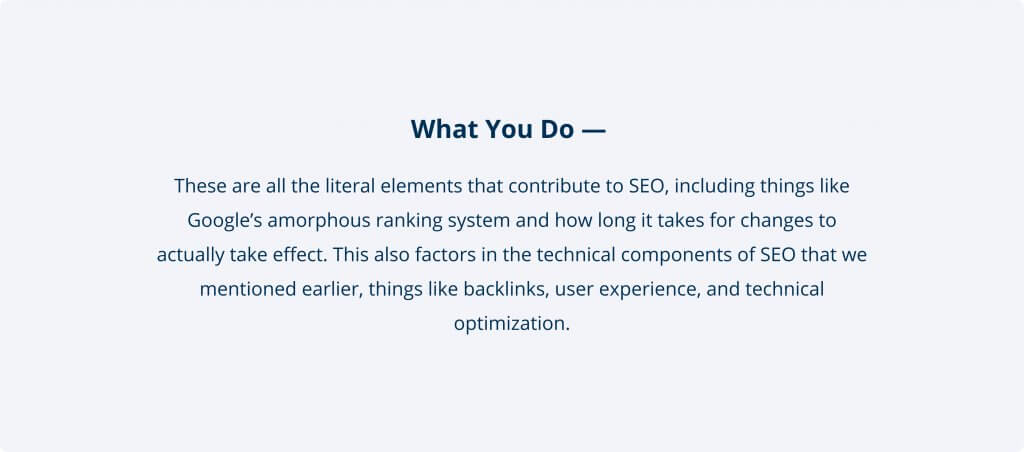
Let’s compare the influence of What You Do to old fashioned maritime trade.
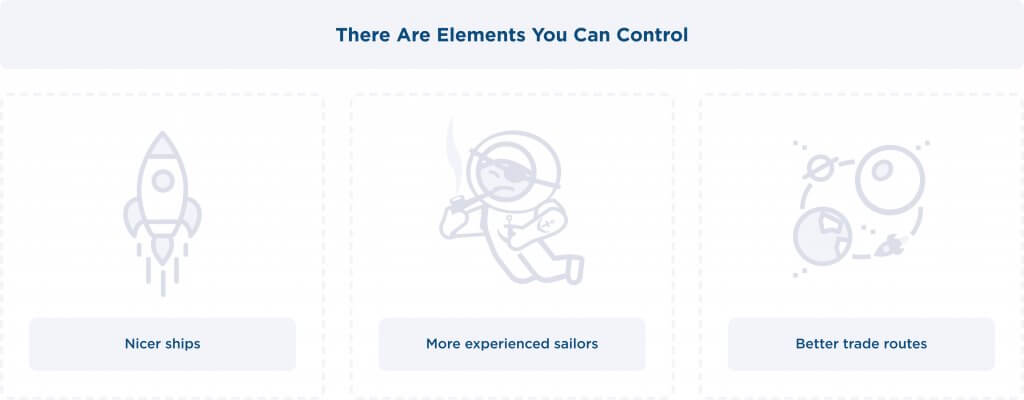

For SEO, Google is basically the ocean.
We can sort of predict how Google is going to act based on past experience, what little information they release about their algorithms, and trial and error.
Beyond that prediction, however, SEO is very much about knowing how to navigate the complexities of the sea, including the unpredictable elements.
It’s not magic, just like sailing isn’t magic.
Some companies are better at navigating the ocean than others because they have more experience or more resources or more talent. And just like a sudden storm on the ocean, Google might decide to release a new update that unexpectedly changes the rules and impacts SEO.
Take Google’s 2011 Panda update for example:
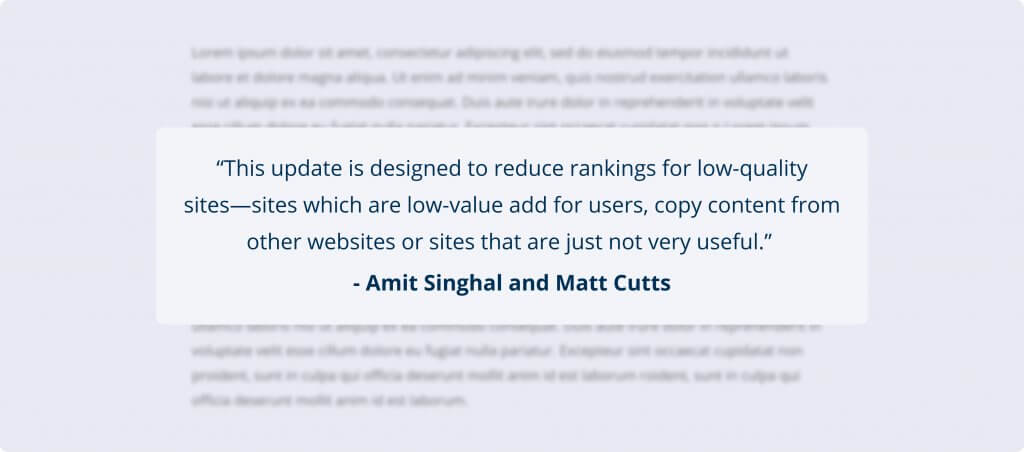
While the intention was to improve the search engine experience for users, the result for SEO teams everywhere was somewhat different:
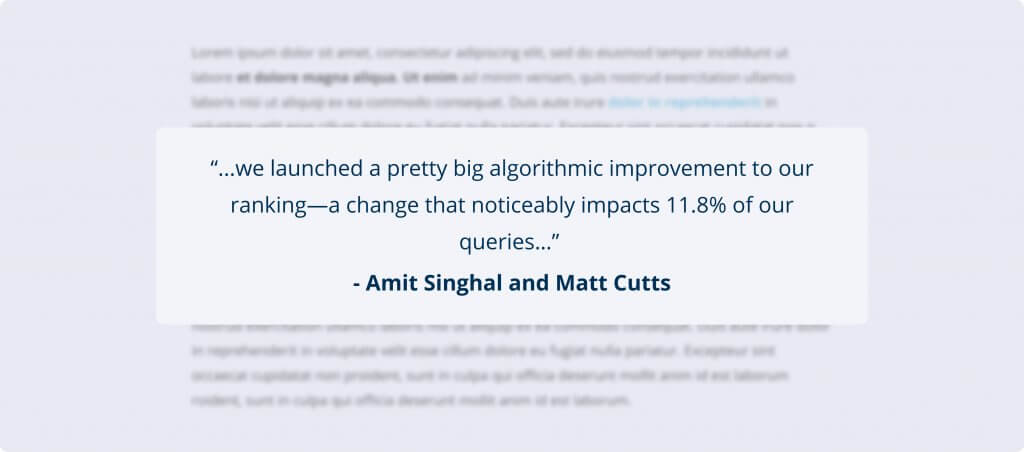
That means almost 12% of searches and websites out there were impacted by this one change made by Google — a change that has gone on to receive more and more updates over the years. Google regularly tweaks and adjusts and adds to their algorithm, and each change has similar potential to alter SEO strategy.
Google is an external factor, which means an SEO team can’t control what they do. A good SEO team will know where and how to respond to these changes, but the shifting relationship makes it difficult to explain SEO to people outside of the industry.
Time is the next big factor in What You Do.
No good SEO strategy is static, and SEO is never instant.
Essentially, you can’t invest in a brand new SEO strategy on Friday and expect the full effects of that investment to show by Monday. People need time to see and interact with the changes.

Additionally, great SEO is more effective the longer you maintain your strategy. Constantly updating and adjusting your strategy will help you mitigate the effects of things like changes to Google’s algorithm, seasonal shifts, and the influence of world events.
That lack of instant gratification, or not being able to immediately see physical evidence that your investment is working contributes to the idea that SEO is some kind of magic process.
SUMMARY: You can’t fully control how rankings are determined, or how SEO affects rankings because rankings depend on external factors like Google.
What your SEO team does control is the SEO process, which involves optimizing channels of your website for a better chance at ranking well.

More experienced or skilled SEO teams will adapt to external factors faster and better, because they have spent more time learning the patterns, reading the changes, and working with past changes.
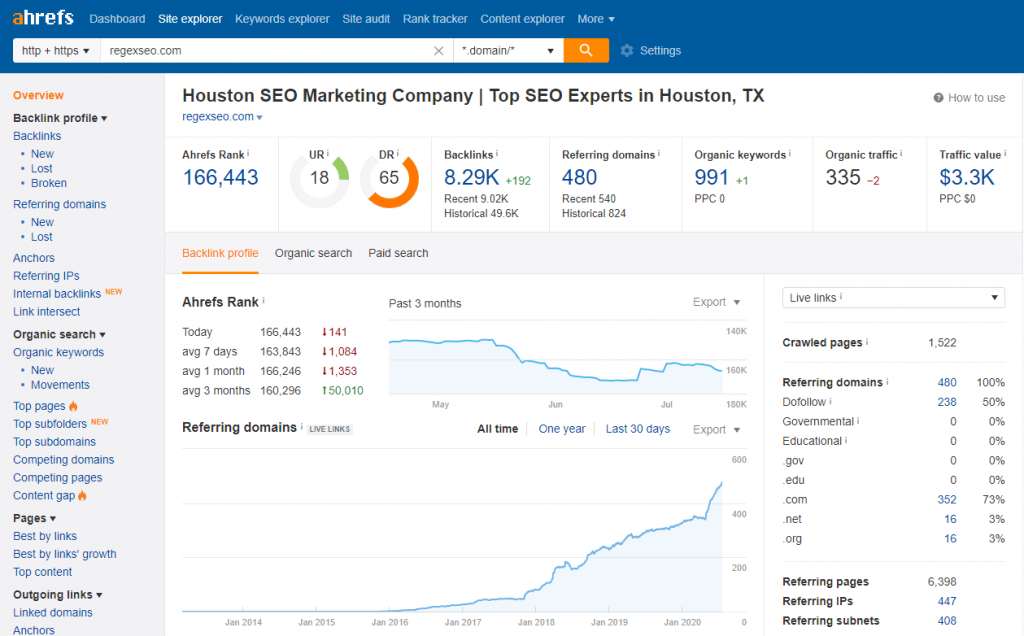
What People See
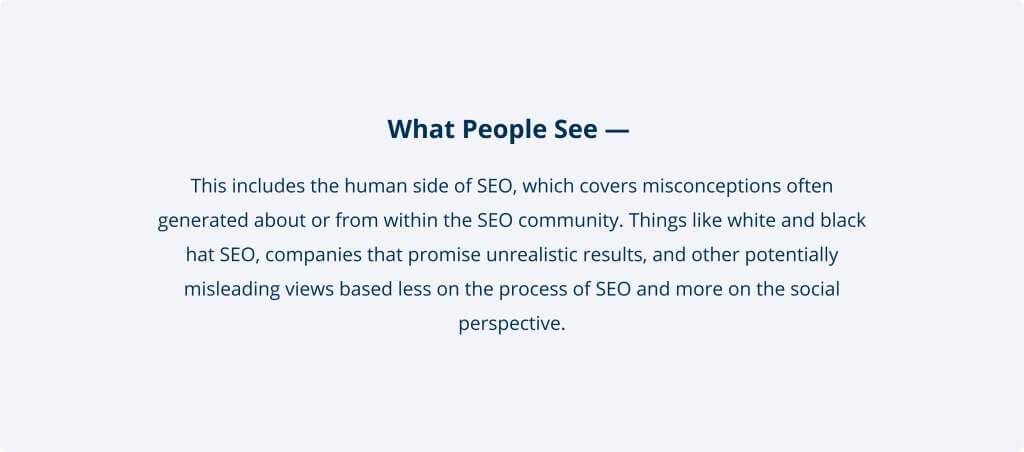
What People See is an umbrella term for all the social reasons SEO is misunderstood, or in some cases, gets a bad reputation.
Just about everyone working in SEO or that might have shopped for SEO has seen the absurd claims and promises or worked with a team that didn’t communicate very well.
Communication Supports Better SEO
What People See has two major issues. The first, of course, being misrepresentation.
Typically, that looks like this:
That’s essentially any and all instances of over promising, overselling, or offering inaccurate information about SEO. The effect is obvious. People can easily misunderstand SEO if most of their interactions are with someone selling them snake oil.
This includes black hat SEO strategies that may produce quick results, but risk long term stability for the website through less scrupulous manipulations of search engine algorithms and ranking factors.
The second issue is a bit more nuanced, and that’s communication between SEO teams and companies. Many SEO teams and companies pitch results over process.
While that’s great for making SEO appear more like a product, it’s not wholly accurate. This is a more subtle, but still major factor in why people misunderstand SEO so often.
SEO teams that sidestep talking with clients to explain the process add to the mystery. Whether they’re successful or not, if all the client sees is a result, they won’t understand why the result can vary when it inevitably does. Simply talking to clients can dramatically improve that relationship.
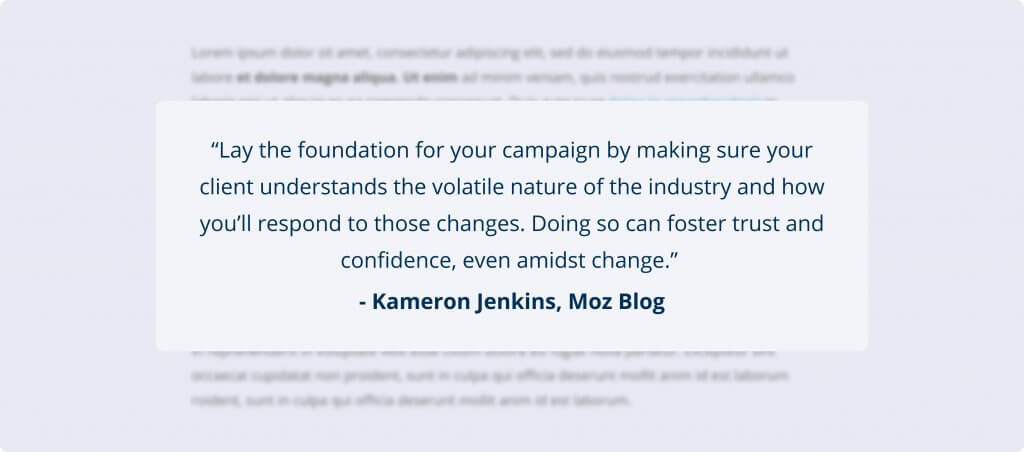
SUMMARY: Unsupported claims and poor communication don’t help with SEO clarity. People saying “Well SEO can do this, SEO can do that” without proof, or companies that work in complete silence are examples of how SEO gets a bad name.
Mythbusting
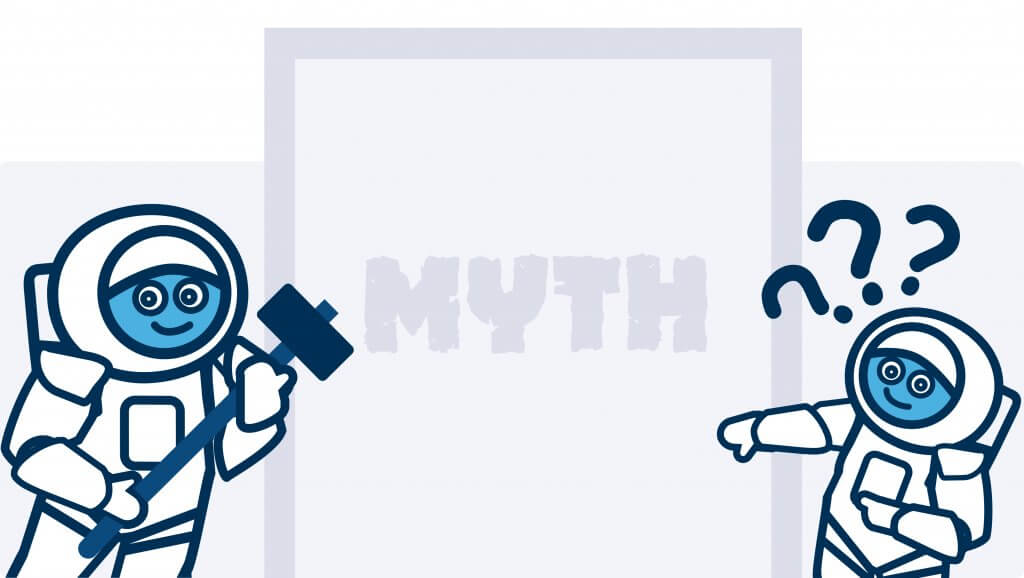
Occasionally, you’ll see myths about SEO pop up on the internet. People will say things like “SEO is dead” or “SEO is just refreshing content and adding new metas”.
These myths contribute to misconceptions about SEO, and some of them are so popular that they are points of contention within the SEO community.
Here you can see Neil Patel talk about how black hat techniques are rarely an issue as we understand it:

He’s of course discussing how “white hat” and “black hat” are not encompassing terms, but more a reference to the intent behind certain techniques, or techniques explicitly discouraged by Google.
Meanwhile several SEO experts in this list of myths assert that black hat techniques are never acceptable, even the more ambiguous forms.
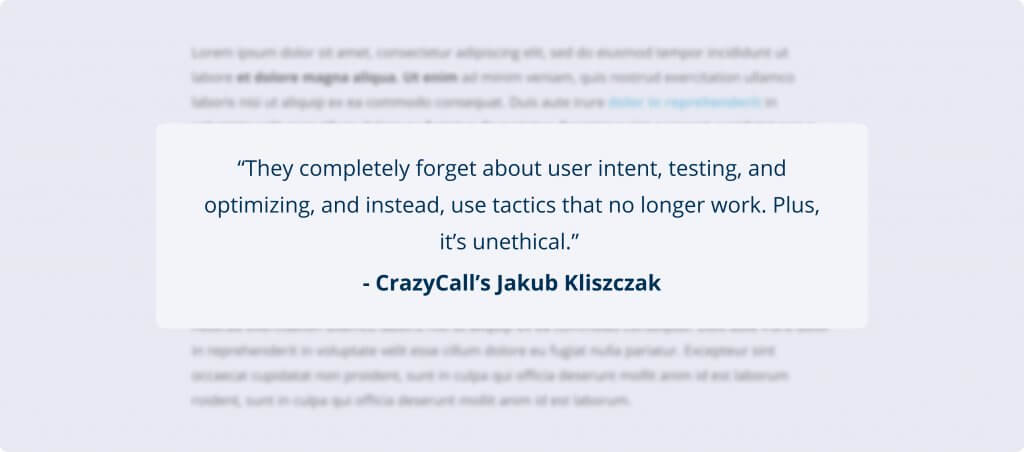
To help clear up more of those myths, we’re going to take a look at a few of the most common myths we’ve dealt with at Regex SEO.
Myth 1 — SEO is a one time fix or a single product.
Many people imagine that SEO is a single process you buy, implement, and then complete.
Rather, it’s an ongoing process that not only builds traffic and visibility, but maintains that traffic and visibility over time. Usually that includes the goal of continued growth alongside ongoing investment.
That means SEO is essentially an adaptive service, rather than a single product.
Some companies do offer isolated services, like producing content or optimizing a page, which can improve rankings short term. But SEO should be an ongoing thing to develop and maintain better rankings over time.
Myth 2 — Guaranteed rankings and timelines.
One of the more sales oriented myths is the promise of #1 rankings by the end of the week. This is a super common one throughout the SEO industry.
Guaranteeing a specific ranking is already a pretty wild claim, but number #1 is outlandish. While it’s not impossible to ‘guarantee’ a #1 ranking, it’s almost always an offer that doesn’t acknowledge the realistic effort and cost of making that happen.
Basically there are limits to what a website can accomplish on its own. Additionally, over-optimizing a website can have negative results.
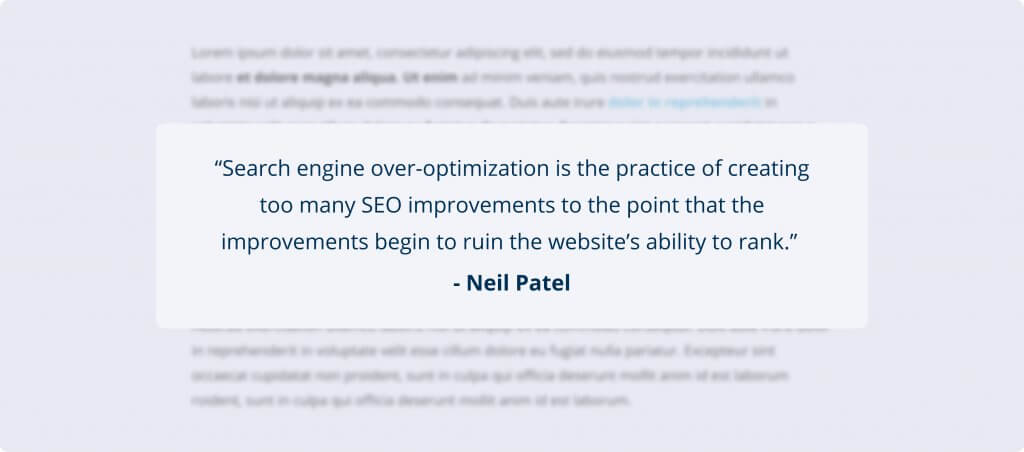
Beyond that you’d need to rely on external content production, technical work for off-website efforts, and digital campaigns to support the site itself. All of which would require a huge budget, well outside of what most companies would want to pay.
Timelines are in a similar boat in most cases. You certainly can see the results of SEO in a few weeks time, but healthy SEO strategies tend to focus on stability and long-term gains over short-term ranking boosts.
Myth 3 — Aspects of SEO, or SEO in general, are dead.
Read SEO news and blogs every few months, and it’s like an obituary — either for some component of SEO or SEO as a whole.
The truth is, SEO is basically always a thing.
How we use certain tools in the SEO kit may change over time to fit new technologies and algorithms from Google, but the mainstays of content, backlinks, technical, and UX are fairly constant.
If anything, SEO evolves alongside the internet and search engines.
Myth 4 — You can game the system for better results.
This is a half true myth.
Technically, it’s possible to use things like keyword stuffing and other less savory tactics to get a quick boost in rankings. But more often than not, they’re simply not effective or sustainable.
As noted in Google’s own quality guidelines:
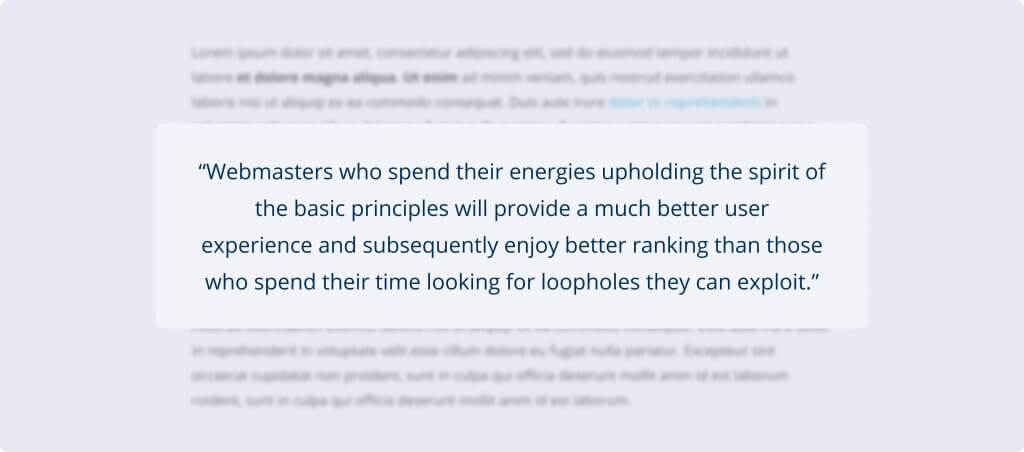
People hear that site ranking is done by one of Google’s algorithms, and they imagine that the best course of action is to write for the bots. Keyword stuffing, invisible text, whatever else you can imagine.
However, it’s 2020. The people writing Google’s search guidelines and algorithms are a bit more advanced, and the whole purpose of constant updates is to improve the search experience for users.
Matt Cutts, one of the original Google team members and longtime Webspam team head until ~2014, noted:
“We’re making Google smarter and smarter. We’re going to keep trying to figure out how to add more value for users and for searchers.”
That means content and SEO that focuses on more value for the user is going to rank higher, even if it’s less keyword dense or missing a few links.
From time to time, little tricks pop up that let you get an edge based on the current system, but Google’s updates are pretty regular to curtail these less genuine strategies.
Myth 5 — You need 100% original content all the time.
As a content writer, this one is a bit tricky.
There’s two aspects — using content from other sources, or repeating content across your own website.
Other Sources:
Plagiarism, duplicate, and automated content are obviously not ideal, but a lot of people take this to mean that significant quotes, discussing similar topics, and using information from other sources are also off the table.
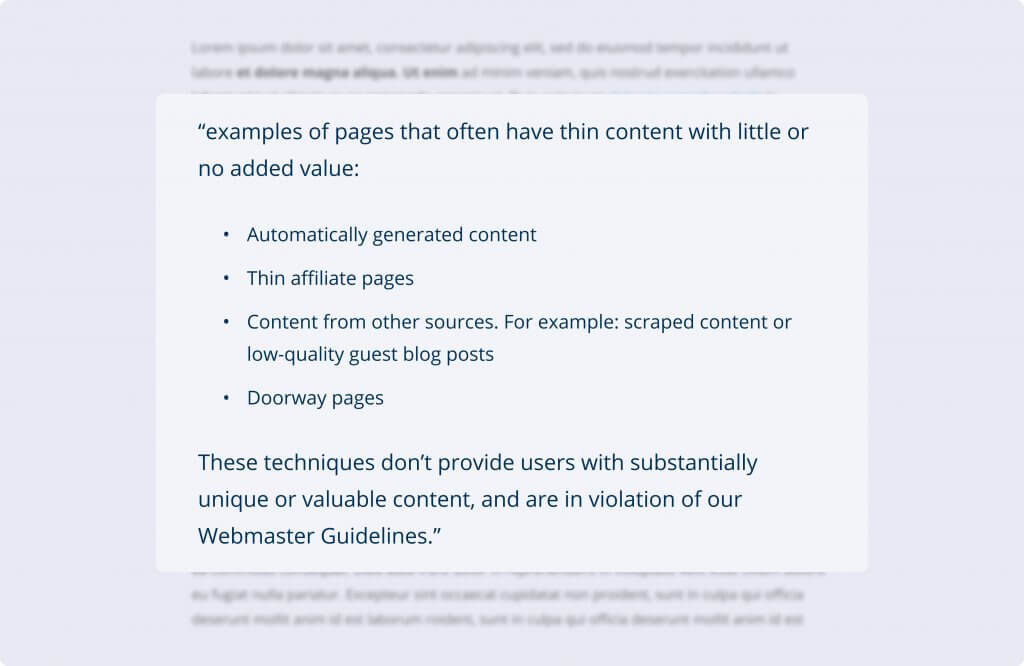
In reality, by providing quotes and links while acknowledging other conversations on the subject, you can generate authenticity and authority.
In reality, providing quotes or links while acknowledging a body of thought on the subject presented in other places generates authenticity. It provides readers with perspective, while also supporting your content with evidence.
Internal Repetition:
Opinions on this vary, but the truth is that pages across your site looking similar aren’t going to hurt as much as people suggest.
As far as Google is concerned:
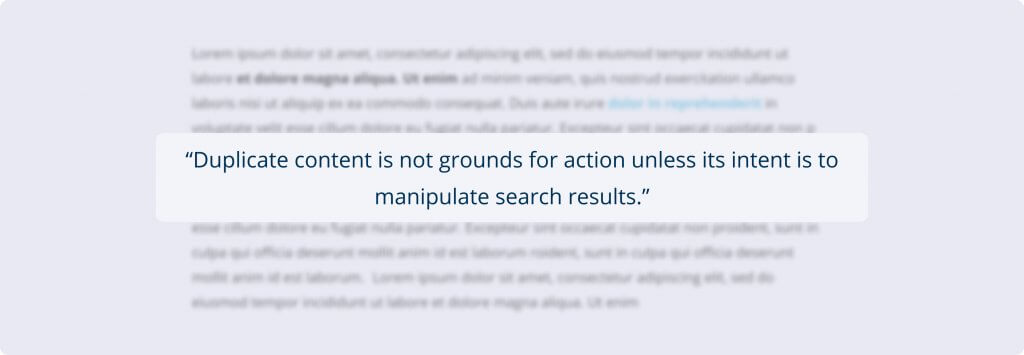
From a user perspective, it’s unlikely that users will visit multiple pages for similar services.
For example, if someone is shopping for windows in Chicago and you have a page for ‘Windows in Chicago’, they probably won’t visit the ‘Windows in New York’ page.
As long as the content on both pages is valuable in terms of info-rich content, links, or optimization, you can probably use a very similar content layout on both pages.
How To Improve

Clearing out myths and misunderstandings is vital because it helps everyone involved in the SEO process set realistic goals and expectations.
By adopting a more open stance, and setting reasonable expectations, the line of communication between SEO client and SEO provider is going to be significantly stronger.
That means a better return on investment for both parties, which often translates to more effective and successful strategies.
Actually Talk to Your SEO Team
If you want to get the most out of your SEO services, talk to your SEO team.
Have a conversation about what your company is doing now, and how you can take it further with SEO or improved SEO. Don’t be afraid to ask questions, or to answer questions your SEO team is asking about your company.
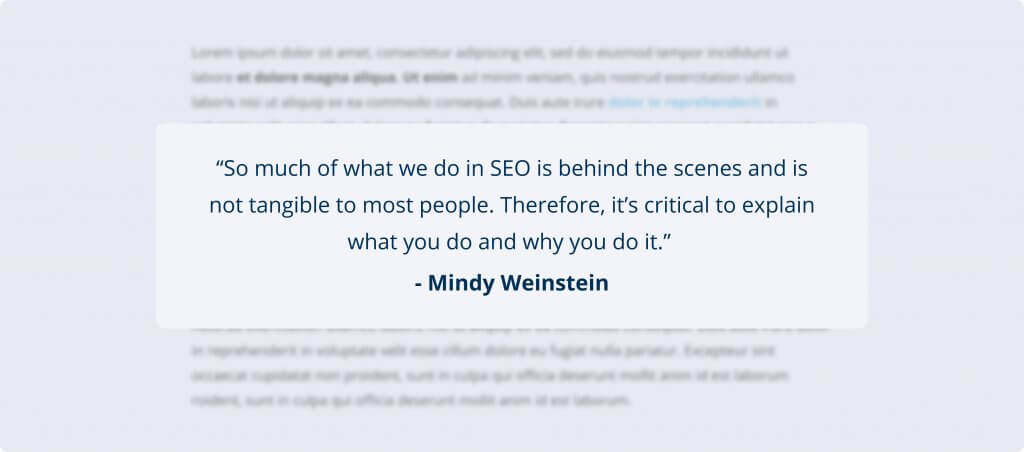
Getting to know each other, whether it’s an internal or external team, gives an SEO team a more clear picture of your business and goals.
A good SEO team won’t guarantee specific results, but they will lay out a clear plan for success based on your resources, current standing, and their capacity to navigate an ever changing search engine.
Understanding SEO
That could be anything from self education to just asking your SEO team how something works when you don’t already know.
Learning more about SEO makes it easier to dispel myths on your own, while also making it easier to communicate with a team of people who spend all their time working on your SEO.
Myth and misconception, coupled with a lack of communication, is the biggest reason companies are unsatisfied with their SEO experience. A mismatch of expectations and what is realistic can easily lead to disappointment, and a good SEO team will clear up those misconceptions early.

Unlearning some of these myths is a great way to start — and having a conversation about what kind of expectations are reasonable is a good way to consistently improve your SEO experience.

